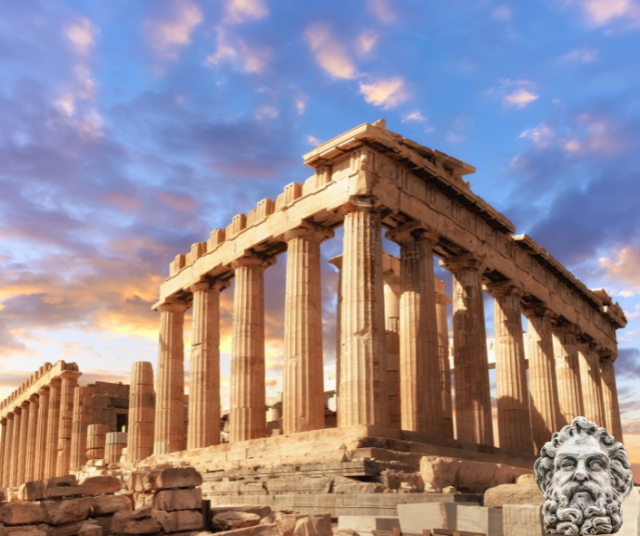Greek mythology is a vast and complex belief system that has left an indelible mark on Western culture. With a rich collection of myths, gods, heroes and mythical creatures, Greek mythology has captured the imagination of people of all ages and generations for centuries. From the mysterious origins of the world to the heroic deeds of its protagonists, Greek mythology offers a unique window into the worldview and psyche of the ancient Greek people.
Origins and development of Greek mythology.
The origins of Greek mythology date back to ancient times, to the first Indo-European tribes who settled in the Balkan Peninsula region around the third millennium BC. These tribes had their own religious beliefs and practices, which included the worship of gods and goddesses. related to nature and the elements.
Over time, these beliefs merged with those of local cultures, such as the Minoan and Mycenaean, giving rise to a more complex and elaborate belief system. Greek stories and myths began to take shape in the Bronze Age, although many of them were passed down orally for centuries before being recorded in writing.
Ancient Greek literature, particularly the works of Homer and Hesiod, played a crucial role in the preservation and dissemination of Greek myths. Homer, in his Iliad and Odyssey, presents an epic version of the stories of the Greek heroes and their exploits during the Trojan War and their subsequent return home. On the other hand, Hesiod, in his works Theogony and The Works and the Days, offers a more systematic view of the genealogy of the gods and the creation of the world.
The development of Greek mythology continued over the centuries, influenced by interaction with other cultures and civilizations, such as the Egyptian, Persian, and Roman. The arrival of Christianity in the Mediterranean world marked the decline of pagan Greek religion, but its legacy lived on through Western literature, art, and philosophy.
The gods and goddesses of Olympus: Rulers of the universe.
The Greek pantheon is made up of a wide variety of gods and goddesses, each with their own personality, attributes, and dominion over specific aspects of the world and human nature. At the top of the divine hierarchy is Zeus, the king of the gods and the lord of sky and thunder. Hera, his wife and sister, is the goddess of marriage and family. Other important gods include Athena, the goddess of wisdom and just war; Apollo, the god of the sun, music and prophecy; Artemis, the goddess of hunting and wild nature; and Aphrodite, the goddess of love and beauty.
Heroes and heroines: Legends of courage and determination.
Greek mythology is full of legendary heroes and heroines who performed heroic deeds and faced impossible challenges. These heroes, often demigods born from unions between gods and mortals, embody values such as courage, cunning, and nobility. Among the most famous heroes are Heracles (Hercules), known for his twelve legendary labors; Perseus, who killed the Gorgon Medusa; Jason, leader of the Argonauts in search of the Golden Fleece; and Theseus, the hero who killed the Minotaur in the labyrinth of Crete.
Mythical creatures: Guardians and monsters.
Greek mythology is populated by a wide variety of mythical and monstrous creatures, some of which are allies of the gods and others that pose mortal threats to heroes and humans. Among the best-known creatures are the centaurs, half-man and half-horse beings; the gorgons, creatures with snakes for hair and petrifying gazes; the cyclops, one-eyed giants; and mermaids, sea creatures with enchanting voices.
Myth in Greek society and culture.
Greek mythology was not only a set of stories and religious beliefs, but also played an important role in the daily life and culture of ancient Greece. Religious festivals, plays, and athletic games were infused with references to Greek myths and gods. Additionally, many aspects of Greek art, literature, and philosophy were influenced by the stories and teachings of Greek mythology.
The lasting influence of Greek mythology.
Over the centuries, Greek mythology has exerted a significant influence on Western culture, inspiring countless works of art, literature, and music. The stories of Greek gods and heroes have been reinterpreted and adapted in a variety of contexts, from poetry and drama to film and video games. Furthermore, many concepts and metaphors derived from Greek mythology have been incorporated into the everyday language and symbolic thinking of Western culture.
Greek mythology is a treasure trove of stories and myths that have endured through time and continue to captivate the imagination of people around the world. With its powerful gods and heroes, its mythical creatures, and its timeless lessons about life and death, Greek mythology remains a source of inspiration and awe in the modern era. Through its study and appreciation, we can connect with the roots of Western culture and better understand our own humanity and the world around us. Greek mythology is more than a set of ancient stories; It is a reflection of the human experience and a window into the depths of our imagination and spirituality.






